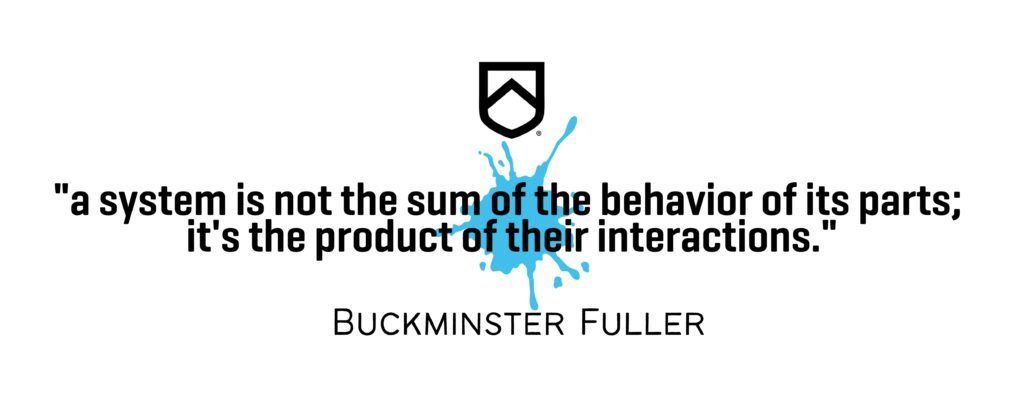Every pre-season, I have individual sit-downs with the athletes I work with, diving into the essence of commitment to their sport. I make it clear that being an athlete isn’t just about those 15-20 hours a week spent training; it’s a 24-7 pursuit.
It’s an all-encompassing, interconnected way of living.
“We’re aiming for an 8/10 across the board,” I tell them. This isn’t about being perfect in any one thing, but being ‘good enough’ at all aspects of life. It’s about striving for excellence without the crippling pressure of being flawless. It’s a philosophy that applies to both sport and life itself.
Every aspect of their training, nutrition, mental well-being, social alignment, recovery, environment — all of it is connected. A failure in one can send ripples across the entire system, just as success in one can elevate the whole. We explore the interconnectedness of the pillars, understanding that the journey we’re embarking on is not merely about physical prowess but a holistic, all-encompassing commitment.
The goal is to create ‘complete’ athletes, ones that not only excel in their sport but flourish in life. It’s about recognizing that the sum of these parts forms a cohesive, living entity, greater than its constituent elements.
With this foundation, we can better grasp why we must move beyond the traditional, narrow views of athletic preparation. We can see why a systems perspective, which emphasizes the comprehensive and interconnected nature of human performance and health, is not just beneficial — it’s essential.
Over the last couple of weeks I’ve had a few conversations with friends who work in the NCAA system. It is clear that coaching in this system is far more than the 3-4 hours they spend on the track each day. And while they may not use the term in this way, I can guarantee you that every College coach is taking a system’s perspective.
But what’s a system’s perspective? And how is this better than a traditional approach to coaching?
Well — it comes down to a growing appreciation that conventional athletic preparation theory, rooted in a reductionist biomedical model, falls short in capturing the complex nature of human performance. While this traditional model emphasizes physical factors, it often overlooks a myriad of influences like psychological, environmental, and social aspects. This oversight stands in stark contrast to the reality of the coaching community, where a more holistic approach to athlete development is widely embraced.
The Limitation of Reductionism
The conventional belief that specific training methods are the primary driver of biological adaptations is increasingly being challenged. It’s well-understood in the coaching community, for example, that identical training stimuli can result in varying inter and intra-individual responses, something often ignored in standard training literature.
Many coaches recognize the importance of non-physical aspects, such as psycho-emotional stress, which can significantly influence training outcomes. However, this realization often conflicts with major coach education organizations, leading to a disconnect between scientific literature and on-the-ground coaching practices. Kechi Anyadike‐Danes’ recent paper, which surveyed coaches’ views on training adaptation, further exposes this disconnect by revealing that less than a third of coaches rated physical training as the most critical factor in determining sports performance.
Embracing a Systems Perspective
In contrast to the reductionist approach, a systems perspective takes a more holistic view, acknowledging that the whole is greater than [and different from] the sum of its parts. It seeks to understand how different components interact and contribute to the overall function of a system. In the context of athlete development, it transcends individual aspects like physical training or nutrition and appreciates the complex interplay between all the elements contributing to an athlete’s overall health and performance.
Here, the athlete is seen as a complex and interconnected entity, with six key pillars working in harmony:
- PHYSICAL TRAINING: this includes the specific sport training, general and specific strength training, flexibility-mobility, and sport science
- NUTRITION & FUELING: this pillar includes a balanced diet, nutrient timing, supplementation, and food allergy and sensitivity
- MENTAL & EMOTIONAL RESILIENCE: includes self-efficacy, emotional regulation, and belief
- SOCIAL & ETHICAL ALIGNMENT: this pillar includes connection & belonging, team cohesion, friends & family, and community involvement
- RECOVERY & REGENERATION: includes sleep, passive & active recovery strategies, and general health.
- ENVIRONMENT & EDUCATION: includes sport-specific knowledge & tactics, training and at-home environment, and continuing education in preparation for post-sporting life
By addressing these pillars in a balanced and interconnected way, we create a comprehensive blueprint that goes beyond mere training, fostering ‘complete’ athletes, ready to excel in both sport and life.

Bridging the Gap
The prevailing biomedical conceptualization of training theory seems increasingly detached from the coaching community.
To bridge this gap, there is a pressing need to recognize, understand, and integrate non-physical influences into training adaptation processes. A systems perspective offers a more nuanced understanding of athletes’ requirements, acknowledging the complexity and interconnectivity of various elements.
Without this shift in perspective, the science risks becoming increasingly irrelevant to those working directly with athletes, hindering the potential for optimal performance outcomes. It’s time to align theoretical frameworks with practical insights, embracing a richer, more holistic path that reflects the intricate nature of human beings themselves.
By transcending conventional training paradigms and embracing a more interconnected and holistic view, we open the door to a deeper, more effective approach to athlete development. This approach not only aligns with the real-world insights of coaches but also promises a richer path to achieving peak health and performance, truly capturing the complexity of the human condition as applied to sport.

